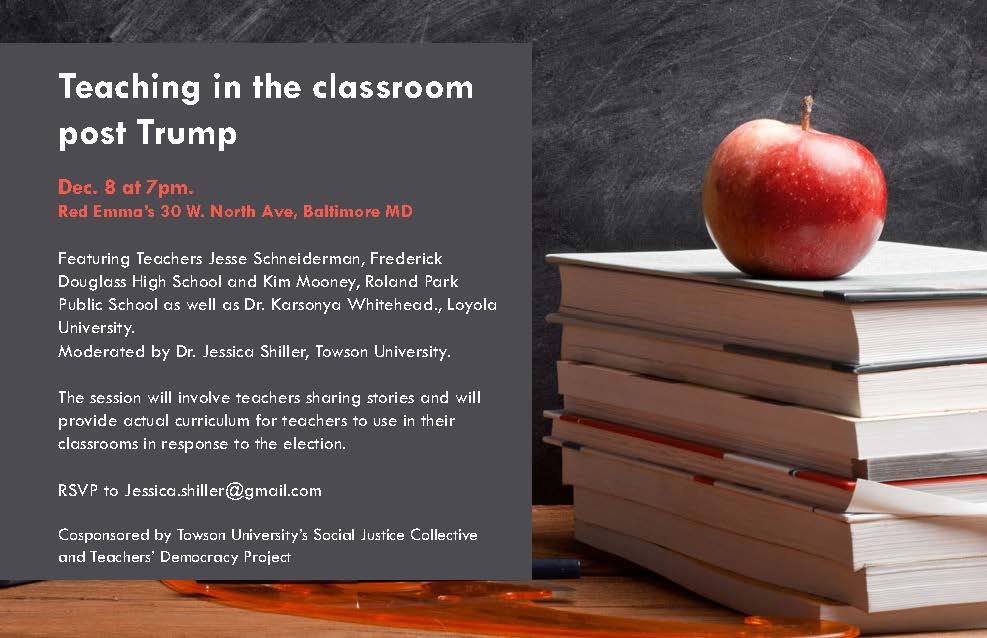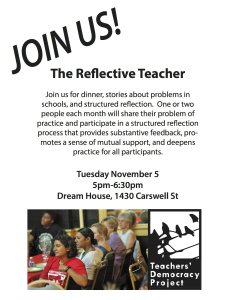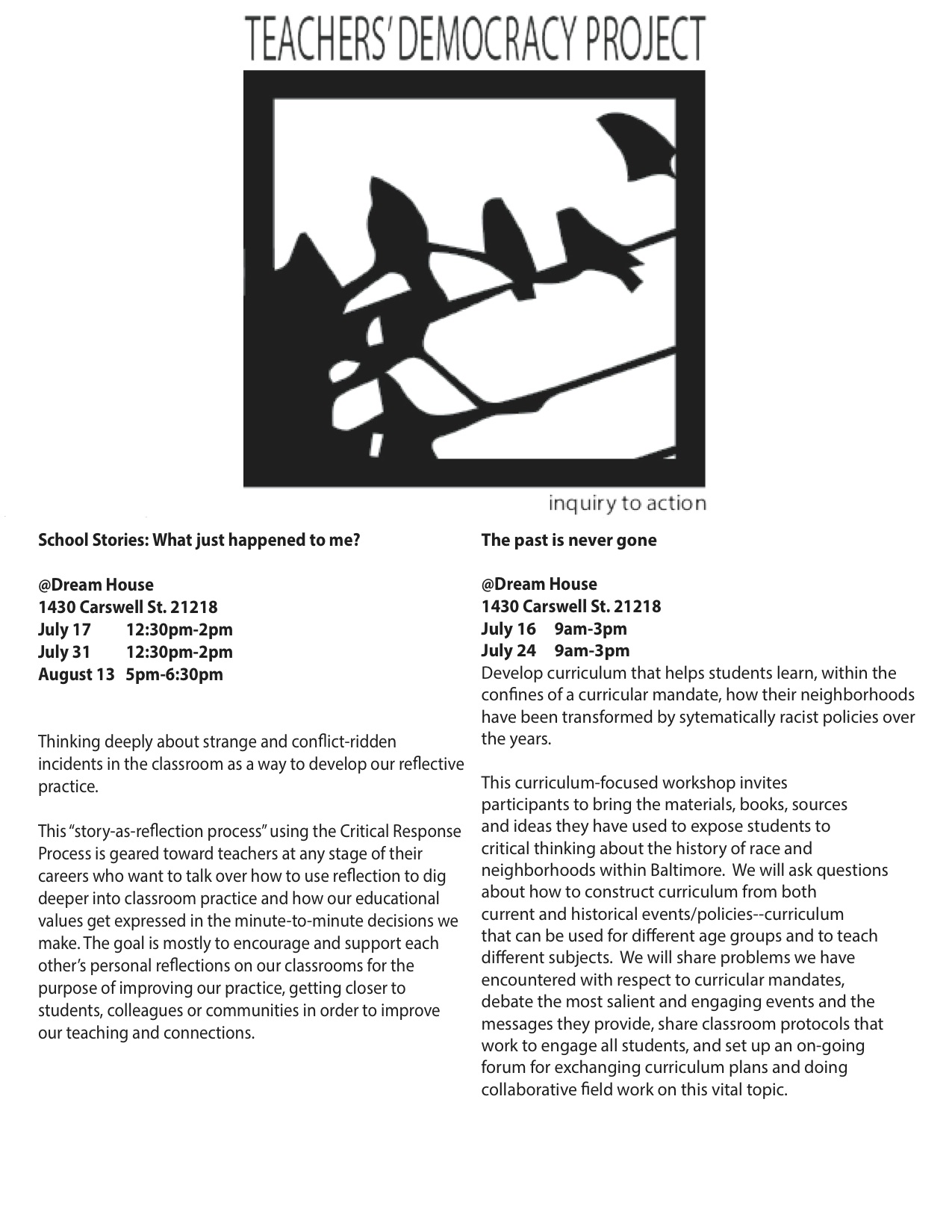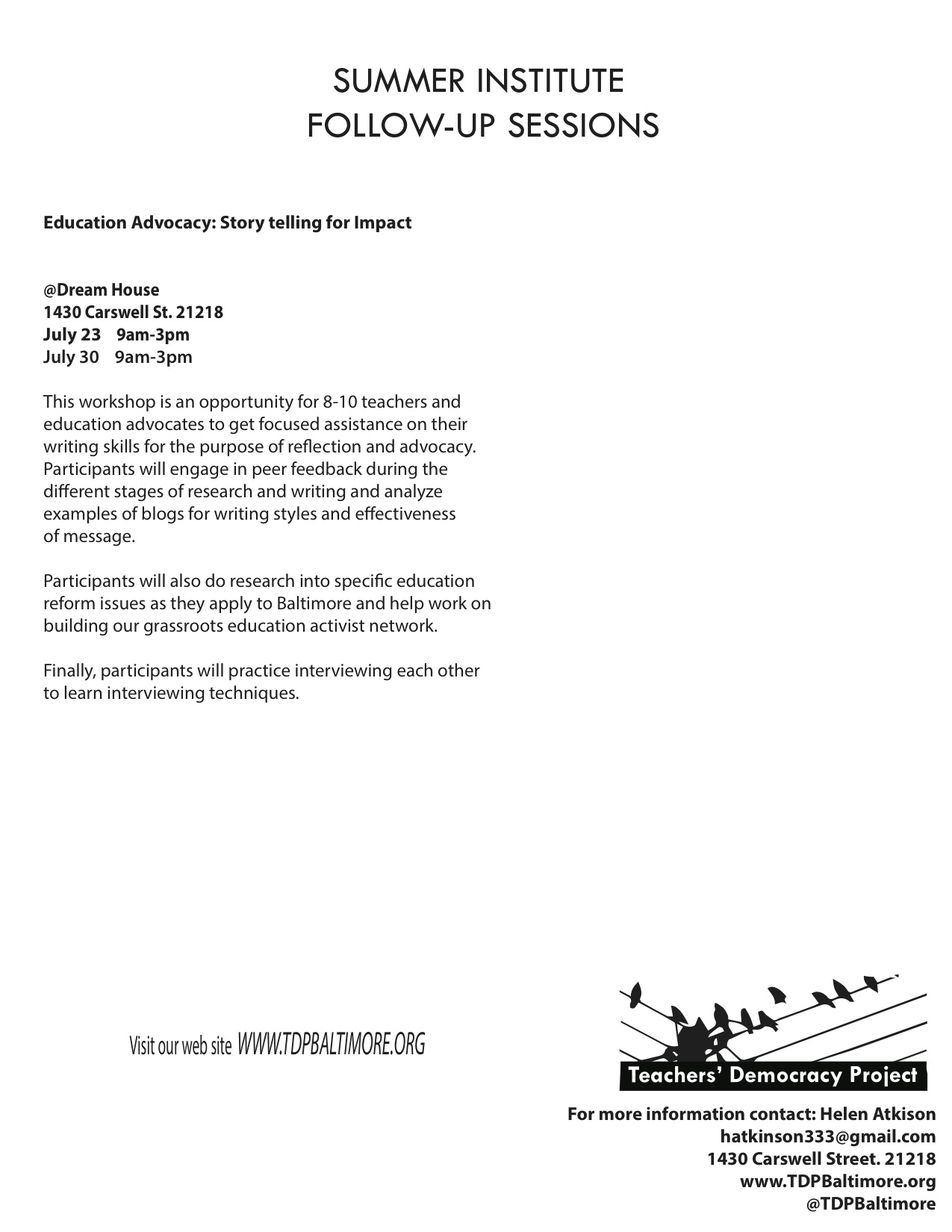Input into the Discipline Policy
Beyond the PTO: Integrating the Village into Schools
Beyond Community Schools
Date: Monday Oct. 3
Location: Parkview Rec and Tech 2610 Francis St. 21217
Time: 6-7:30
Baltimore City Schools recently released a policy that formally supports the presence of community schools in Baltimore. While TDP sees this policy as a very positive move, we also want to take the chance to discuss a more expansive vision of what it would take to truly change the culture of schools so that they include the voices of teachers, parents, community members and students. Come together to contribute to a conversation about the new policy. We will hear from a panel of local community activists and educators to gain insights into innovative models with a community-centered approach, and share ideas and questions. TDP will compile the ideas and questions to share with the school board so we can advocate for a more robust policy across all community schools. The event is free to attend and snacks and refreshments will be provided.
Strengthening the link between communites and school
Discussion of Community Control of Schools with Jitu Brown
Join the Teachers’ Democracy Project and partners for a discussion with Jitu Brown about a model for running a school called Community Control of Schools. The idea focuses on what would schools look like if they were run by the community?
Dinner will be provided. Child care will be provided upon request. RSVP at https://www.eventbrite.com/e/discussion-of-community-control-of-schools-with-jitu-brown-tickets-25996592508
Curriculum Story Circle
This is where discussion groups will look at what students really want to learn, what community members believe in, and what teachers are required to teach and how these different perspectives contrast and collide.
Monday, April 4th from 5:30pm -7pm. (Light Dinner at 5pm)
1430 Carswell St, Baltimore, MD 21218
Join Us in Making the Schools We Deserve!
Click here to GET INVOLVED!
People's State of the Union
Share your stories on Saturday, January 30th, 10:00am-11:30am, 1430 Carswell St. Baltimore, Md 21218. Refreshments will be provided. RSVP here. Between January 23-31, 2016, individuals and organizations across the U.S. will sign up to host story circles as part of The People’s State of the Union. Every January, the President delivers a State of the Union address highlighting important issues from the past year and suggesting priorities for the coming year. The People’s State of the Union is an invitation to supplement the President’s stories with our own. #PSOTU2016
We will each tell a three minute story about one of these prompts that we will share with the PSOTU poets who write a People’s State of the Union from all of our stories that they will perform on February 20:
- Share a story you think the next President absolutely needs to hear about what is happening in Baltimore City and how is it impacting schools in your community.
- Share a story about a time you felt a sense of belonging —or the opposite—in a school and/or community in Baltimore.
See Poetic Address 2015 here.
Click here to RSVP for #PSOTU2016
From Baltimore to Chicago to the World--One Struggle
Video 2 Beginner Workshop
Ideally, participants will choose a larger theme that shorter assignments could contribute to. So, if your topic is: Charters should drop the lawsuit, then in every class you would create a piece that adds something to your topic.
Examples of topics:
- Charters should drop their lawsuit
- Every student at City College needs to be able to take the IB
- Bullying in School: Young people as peace keepers
- Students’ Bill of Rights: A Series of Dramatizations
- Students getting a say in the assessment of their own learning
- A good parent-teacher conference where the power and learning goes both ways
- What parents think about school
- Why my school needs more money
The next level (intermediate) class will be offered in spring 2016, with 6 group sessions plus one-on-one assistance focused on developing a polished final product that could screen at the TDP end-of-year event: “School Stories: The Human Face of Policy.” This intermediate class starts on February 24th and finishes on June 9. For those that want to create pieces that can be used in advocacy or professional development, we encourage participation in both sessions.
As a participant in the class you gain access to TDP’s video equipment that can be used in the classroom or for other education projects. There is a stipend of $350 available for anyone who produces a finished product by June 9.
Schedule: 6 Wednesday sessions- Dec. 2, 9, 16 & Jan 6, 13, 20 5-7pm
Session Overview (will alter based on the interest of participants)
-
Power and privilege as a filmmaker: Who are you as the video producer? If you are telling someone else’s story how are you sure they would approve?
-
What makes for a powerful story in documentary? Creating the narrative arc.
-
The steps: Research history and context, outline goals and narrative structure (can change but helps to determine questions), identify key players/interviewees, determine shooting style, identify broll, editing, titles or narrator, finishing.
-
Assignment- create your documentary plan (template provided)
-
Shooting Techniques- sound, interviewee placement, light, talk room, shots
-
How to make a story from interviews
-
Assignment- conduct a short interview
-
Watching samples and decoding for audience and message and analyzing technique
-
Techniques for how to shoot a dramatization
-
Storyboards and shot lists
-
Design your own PSA
-
Assignment: Shooting PSA using in camera edits as much as possible
-
Edit PSA or interview in class
-
Assignment- Finish editing
-
Watch PSA’s or edited interview and examine for quality of sound, image, creativity, narrative arc, message
-
Add titles, music, fades, audio levels
-
Assignment: Document a class or important meeting.
Event Video--THE FUTURE OF CHARTERS IN MARYLAND
Event--The Reflective Teacher
Blog Post--Grace Lee Boggs
GRACE LEE BOGGS: One of the difficulties when you're coming out of oppression is that you get a concept of the messiah. You have to get to that point that we are the leaders we've been looking for. We are the children of Martin and Malcolm. I don't know what the next American revolution is going to be like, but we might be able to imagine it, if your imagination were rich enough.
Read the full transcript of interview excerpts here.
Workshop--Social Justice Curriculum Writing Workshops
Join Our inquiry-to-action-group (ITAG)
This ITAG is an opportunity for 6-8 teachers to research and implement a social justice unit plan to be published using a peer-review process (similar to the Chicago Grassroots Curriculum). Building on the curriculum planning work begun during the TDP Summer Institute, teachers get together in interest/subject area groups to discuss details of protocols they are using in their classrooms, share student projects, research useful resources, and invite local experts and community leaders to join their discussions. The goal is for teachers to find common ground in their day-to-day classroom work, and to find ways to collaborate more deeply in inter-school projects and organizing efforts. Participants may earn a stipend of up to $500. The whole project will take approximately 45 hours from early October to mid-December. Participants in the TDP Summer Curriculum Workshop have priority for this workshop:
Curriculum Workshop to discuss research, original source documents, readings, and pedagogy Individual planning and preparation of curriculum with peer feedback online Documenting implementation, refining, publishing to share online, at conferences, as school-based PD
Limited space available. Register here.
Group--The Reflective Teacher
Join us for dinner and stories about problems of practice in schools and classrooms. One or two people each month will share their stories and participate in a structured reflection process that provides substantive feedback (on issues such as race and identity), promotes a sense of mutual support, and deepens practice for all participants. Click here to register.
Thursdays 5pm -7pm
Dream House, 1430 Carswell St.
November 5, 2015
SPECIAL EVENTS
Network with other teachers and education advocates as you watch films, listen to panels and discuss ideas on a range of topics of interest to educators and community members.
Click here to register for any of the following dates.
Thursdays 6pm-8pm (Locations to be announced)
Oct 15 “Charters: The Illusion of Change” (Register for this event here)
Mar 17 “Teacher Activism in Baltimore”
Apr 21 “Corporatized: The Real Story About the Public Education Takeover”
Jun 9 “School Stories: The Human Face of Policy”
Education Advocacy Follow-Up Session II
July 30
9AM-3PM DREAM HOUSE 1430 CARSWELL ST., 21218
This workshop is an opportunity for 8-10 teachers and education advocates to get focused assistance on their writing skills for the purpose of reflection and advocacy. Participants will engage in peer feedback during the different stages of research and writing and analyze examples of blogs for writing styles and effectiveness of message.
Participants will also do research into specific education reform issues as they apply to Baltimore and help work on building our grassroots education activist network.
Finally, participants will practice interviewing each other to learn interviewing techniques.
School Stories: What Just Happened to me? Follow-Up Session II
July 31
12:30pm-2pm Dream House 1430 Carswell St., 21218
Thinking deeply about strange and con ict-ridden incidents in the classroom as a way to develop our re ective practice.
This “story-as-re ection process” using the Critical Response Process is geared toward teachers at any stage of their careers who want to talk over how to use reflection to dig deeper into classroom practice and how our educational values get expressed in the minute-to-minute decisions we make. The goal is mostly to encourage and support each other’s personal reflections on our classrooms for the purpose of improving our practice, getting closer to students, colleagues or communities in order to improve our teaching and connections.
The past is never gone Follow-Up Session II
July 24
9am-3pm Dream House 1430 Carswell St., 21218
Develop curriculum that helps students learn, within the con nes of a curricular mandate, how their neighborhoods have been transformed by sytematically racist policies over the years.
This curriculum-focused workshop invites participants to bring the materials, books, sources and ideas they have used to expose students to critical thinking about the history of race and neighborhoods within Baltimore. We will ask questions about how to construct curriculum from both and historical events/policies--curriculum that can be used for di erent age groups and to teach di erent subjects. We will share problems we have encountered with respect to curricular mandates, debate the most salient and engaging events and the messages they provide, share classroom protocols that work to engage all students, and set up an on-going forum for exchanging curriculum plans and doing collaborative eld work on this vital topic.















